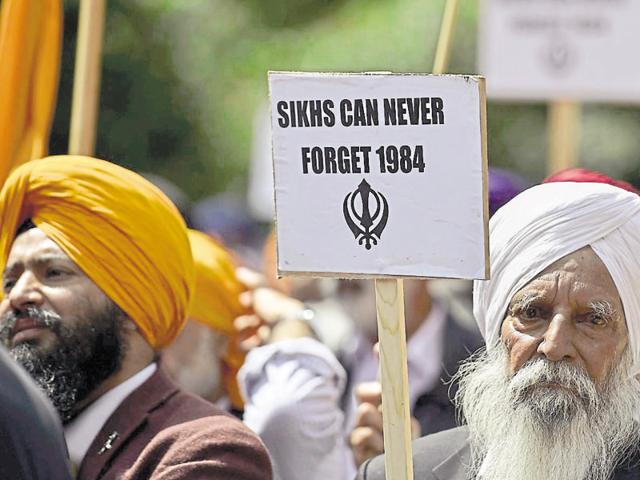Terrorism and communal violence must carry same stigma and punishment
Stigma and law must apply equally to those who participate in terror crimes and to those who target people for their religious or caste identity
Three men have been marched to the gallows in recent years in India. All three were convicted of terror crimes. By contrast, I cannot recall a single person awarded the death penalty for communal violence since Independence.

Yakub Memon, convicted for complicity in the 1993 Bombay terror blasts, spent 21 years in prison without a day’s parole before his hanging. Maya Kodnani, convicted for being what the trial court described as the ‘kingpin’ in the 2002 massacre in Naroda Patiya which left 97 people dead — including 35 women and 36 children who were burnt alive, stabbed and dismembered — was awarded imprisonment for life. But she was granted three months’ bail in November 2013 for medical treatment, and the Gujarat High Court confirmed her bail for ill-health from July 2014, which continues until the time of writing.
In both popular, social common sense and the ways in which the laws are designed and implemented in India, there is an implied hierarchy of crimes, in which gravest crimes are seen to be those connected with terror and violence, meriting harsh laws, criminal procedures that severely curtail human rights of the accused, and stricter penalties including death. However, communal violence is akin to terror crimes because it is also driven by hate ideologies and target innocent populations with death and destruction. It is remarkable that these do not carry the same censure and disgrace as terror crimes, both in popular morality and in the framing and implementation of the law.
Read | Old pain, just in new bottles
This hierarchy of crimes was accepted in the Law Commission report, chaired by progressive Justice AP Shah, which recommended the abolition of the death penalty in all crimes except terror-related ones and waging war against the State. This same idea — that crimes of terror fall into a different category from other crimes, including those that target people for their religious and caste identities — is the rationale for special terror laws in India (as in many parts of the world). These laws dilute accepted standards of human rights protection of the accused. They permit statements before police officials as evidence admissible in courts, ignoring that such statements may have been coercively obtained by torture. They delay the period for communicating charges and submitting charge-sheets, and discourage bail.
There are some who argue that these human costs are regrettable but inevitable when the country battles the ever-looming perils of terror attacks; the costs of possible injustice to a small number are morally acceptable to protect the majority from terror violence. This is a deeply problematic position because justice is indivisible and injustice to some cannot result in authentic justice for the many. However, even in a practical sense, officially sanctioned and effected injustice can only breed fear and discontent that would further imperil the social order.
Remarkably, the same arguments are not applied to communal hate crimes. We have studied the aftermath of many communal massacres since Independence, and what binds them all is the pattern that few, if any, are punished for these crimes. This is the outcome of the communal bias or apathy of all arms of the criminal justice system: The police, prosecution, and courts; and the political, social and economic powerlessness of the victims of communal crimes. Among the survivors of these crimes — many of whom fight epic and hopeless battles for justice like the widows of the 1984 Sikh massacre or the survivors of the 2002 Gujarat massacre — there is little popular outrage that these crimes go unpunished. Unlike for terror crimes, there is no demand for special laws and procedures to ensure different standards of gathering evidence, issuing bail and punishment for those who commit hate crimes against persons of a particular religion or caste. We wish to see those responsible for the 1993 Mumbai blasts hang, but we are indifferent when those named guilty by the judicial commission for the Mumbai communal killings in 1992-93 continue to walk free.
Read | 1984 riots: GK seeks Modi’s help for expediting probe into cases
I am neither making a case for death penalty for perpetrators of communal violence, nor for the dilution of their basic human rights. What I am arguing is that both popular stigma and the imperative of law should apply equally to those who are alleged to participate in terror crimes as those who are charged with hate crimes targeting persons for their religious or caste identity. The selectivity of or popular outrage and the application of the majesty of the legal system reveals a very troubling underlying majoritarian bias in society and law. A majority of those charged with terror crimes are religious minorities. While a majority of those charged with communal crimes are from the majority Hindu community, its victims are mostly religious minorities.
If law and social outrage apply so differently when the minority is charged with hate crimes from when they are the paramount victims of mass hate crimes, then the promises of a secular Constitution — of equal treatment of all before the law — stands exposed, in tatters.
Harsh Mander is convener, Aman Biradari
The views expressed are personal




